Arts & Entertainment
Dating app encourages users to make ‘virtual’ connections
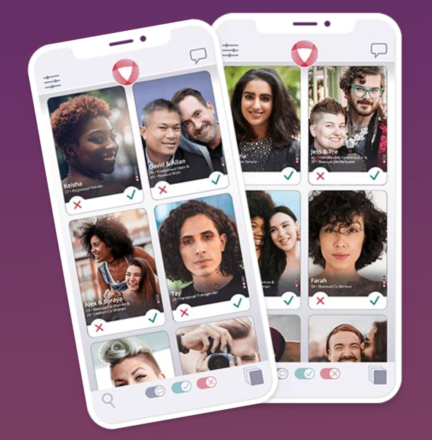
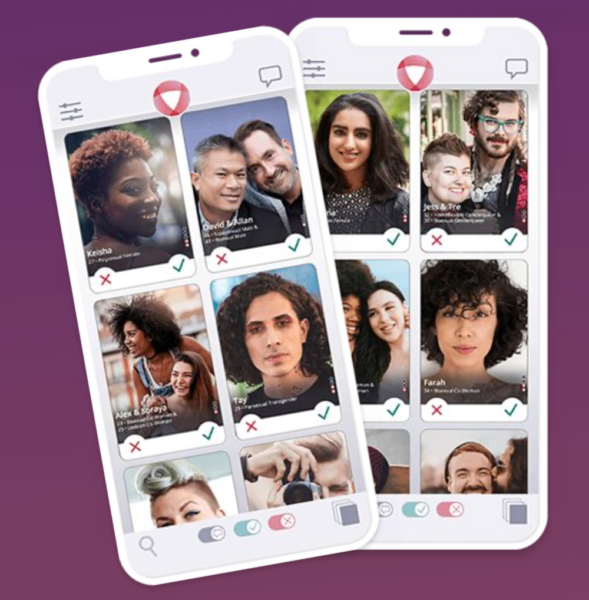
A dating app is telling its users that “now is not the time” for meeting up in person and encouraging them to use their platform to explore virtual relationships instead.
A relative newcomer among the array of dating apps, #open was launched by co-founders Amanda Wilson and David Epstein, who themselves met on a dating app in 2015 and decided to build one of their own a year later. By 2018, their brainchild was in the Apple app store, and Android began offering it in April of 2019. Since then, it has grown to serve over 48,000 users – with an impressive 43,000 matches made.
What makes this app different from Grindr or Tinder, or any of the other better-known players in the game?
According to Epstein, “As our name implies, it’s an app that’s been built for people with a fairly open mindset, when it comes to human sexuality.”
A look at the wide array of identities and orientations among their users (besides offering 24 different gender identities and 23 sexual orientations to choose from, the app also lets you enter your own), as well as the high percentage of people identifying as being in non-traditional relationships, gives a clear picture of why #open has a unique appeal.
Epstein elaborates, “The one thing the users have in our community have in common, more than anything else, is that 95% of our users identify as being in some kind of an open relationship – whether that’s the 28% that are polyamorous or the 5% that consider themselves ‘monogom-ish’ or anything in between.’ That’s the common thread.”
Perhaps the fledgling app’s targeted focus accounts for the growth in its numbers, but with the last two months seeing a particular rise in both new user profiles and user interactions, it’s likely also a reflection of coronavirus fears beginning to drive people online in greater numbers. Whatever the reason behind it, the company’s co-founders want to live up to their core value as an “honest dating app” and make sure its swelling membership is practicing “social distancing” by getting to know potential partners remotely instead.
As Wilson puts it, “People right now are trying to figure out how they’re going to maintain their connection and their community, and their social lives, and apps are meeting one of those needs, obviously. We’ve been saying for a while that dating has been changing, and now this is going to bring more change, for a little bit.”
With that in mind, she says, the company made the decision to send out a message to all of its users on Monday, “urging them to remember that there is no safe sex, there is only safer sex, and that now is not the time to be swapping spit with people, and to stay home.”
Epstein elaborates further, “We’re a sex positive app, and the people in our community understand the incredible importance of transparency – especially when you’re talking about people in polyamorous relationships, or practicing ethical non-monogomy. And of course, we have huge at-risk populations here. We just don’t think you can play it too safe right now.”
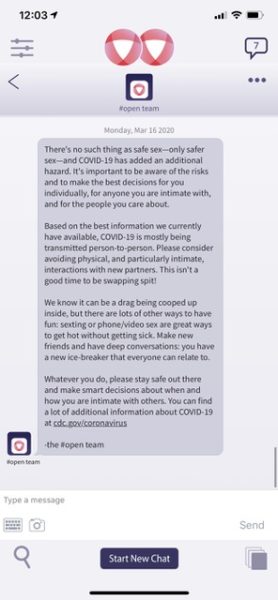
Rather than using the app to arrange intimate in-person encounters, the company suggests taking an opportunity to work on aspects of dating that are often ignored in our age of instant gratification.
“We really think it’s a time to explore communicating,” says Epstein, “through the app, or through Facetime or any of the other tools people have available to them on their smart phones.”
“Relationships are all about communication,” Wilson interjects. “So, you know, swipe right more often, talk to people that you wouldn’t necessarily usually talk to.”
“And you know it doesn’t have to be boring,”she adds. “There are things that you can do to spice up your lives when you’re stuck inside.”
“If you are exploring your sexuality,” Epstein elaborates, “we think this is a time to explore it in a virtual way.”
Anyone with a smart phone and a libido is sure to understand exactly the kind of thing they are hinting at, and though it may not be as good as “IRL” for a lot of us, it’s definitely something to explore as a means of getting through what could be a long haul of ethical self-isolation.
“We need to lean into the long game,” Wilson stresses. “In this day and age when you can get anything at any time, within a couple of hours, we’re used to immediacy – but now we can get to know people again, and play around with delayed gratification.”
Epstein interjects, “There will be a lot of delayed gratification built up on the other side of this, and that’s not necessarily a bad thing.”
Wilson, with a similarly positive attitude, sums the situation up.
“We’re going to be in our own homes for a while now – and that’s okay. Dating will rebound.”
Sports
US wins Olympic gold medal in women’s hockey
Team captain Hilary Knight proposed to girlfriend on Wednesday

The U.S. women’s hockey team on Thursday won a gold medal at the Milan Cortina Winter Olympics.
Team USA defeated Canada 2-1 in overtime. The game took place a day after Team USA captain Hilary Knight proposed to her girlfriend, Brittany Bowe, an Olympic speed skater.
Cayla Barnes and Alex Carpenter — Knight’s teammates — are also LGBTQ. They are among the more than 40 openly LGBTQ athletes who are competing in the games.
The Olympics will end on Sunday.
Movies
Radical reframing highlights the ‘Wuthering’ highs and lows of a classic
Emerald Fennell’s cinematic vision elicits strong reactions

If you’re a fan of “Wuthering Heights” — Emily Brontë’s oft-filmed 1847 novel about a doomed romance on the Yorkshire moors — it’s a given you’re going to have opinions about any new adaptation that comes along, but in the case of filmmaker Emerald Fennell’s new cinematic vision of this venerable classic, they’re probably going to be strong ones.
It’s nothing new, really. Brontë’s book has elicited controversy since its first publication, when it sparked outrage among Victorian readers over its tragic tale of thwarted lovers locked into an obsessive quest for revenge against each other, and has continued to shock generations of readers with its depictions of emotional cruelty and violent abuse, its dysfunctional relationships, and its grim portrait of a deeply-embedded class structure which perpetuates misery at every level of the social hierarchy.
It’s no wonder, then, that Fennell’s adaptation — a true “fangirl” appreciation project distinguished by the radical sensibilities which the third-time director brings to the mix — has become a flash point for social commentators whose main exposure to the tale has been flavored by decades of watered-down, romanticized “reinventions,” almost all of which omit large portions of the novel to selectively shape what’s left into a period tearjerker about star-crossed love, often distancing themselves from the raw emotional core of the story by adhering to generic tropes of “gothic romance” and rarely doing justice to the complexity of its characters — or, for that matter, its author’s deeper intentions.
Fennell’s version doesn’t exactly break that pattern; she, too, elides much of the novel’s sprawling plot to focus on the twisted entanglement between Catherine Earnshaw (Margot Robbie), daughter of the now-impoverished master of the titular estate (Martin Clunes), and Heathcliff (Jacob Elordi), a lowborn child of unknown background origin that has been “adopted” by her father as a servant in the household. Both subjected to the whims of the elder Earnshaw’s violent temper, they form a bond of mutual support in childhood which evolves, as they come of age, into something more; yet regardless of her feelings for him, Cathy — whose future status and security are at risk — chooses to marry Edgar Linton (Shazad Latif), the financially secure new owner of a neighboring estate. Heathcliff, devastated by her betrayal, leaves for parts unknown, only to return a few years later with a mysteriously-obtained fortune. Imposing himself into Cathy’s comfortable-but-joyless matrimony, he rekindles their now-forbidden passion and they become entwined in a torrid affair — even as he openly courts Linton’s naive ward Isabella (Alison Oliver) and plots to destroy the entire household from within. One might almost say that these two are the poster couple for the phrase “it’s complicated.” and it’s probably needless to say things don’t go well for anybody involved.
While there is more than enough material in “Wuthering Heights” that might easily be labeled as “problematic” in our contemporary judgments — like the fact that it’s a love story between two childhood friends, essentially raised as siblings, which becomes codependent and poisons every other relationship in their lives — the controversy over Fennell’s version has coalesced less around the content than her casting choices. When the project was announced, she drew criticism over the decision to cast Robbie (who also produced the film) opposite the younger Elordi. In the end, the casting works — though the age gap might be mildly distracting for some, both actors deliver superb performances, and the chemistry they exude soon renders it irrelevant.
Another controversy, however, is less easily dispelled. Though we never learn his true ethnic background, Brontë’s original text describes Heathcliff as having the appearance of “a dark-skinned gipsy” with “black fire” in his eyes; the character has typically been played by distinctly “Anglo” men, and consequently, many modern observers have expressed disappointment (and in some cases, full-blown outrage) over Fennel’s choice to use Elordi instead of putting an actor of color for the part, especially given the contemporary filter which she clearly chose for her interpretation for the novel.
In fact, it’s that modernized perspective — a view of history informed by social criticism, economic politics, feminist insight, and a sexual candor that would have shocked the prim Victorian readers of Brontë’s novel — that turns Fennell’s visually striking adaptation into more than just a comfortably romanticized period costume drama. From her very opening scene — a public hanging in the village where the death throes of the dangling body elicit lurid glee from the eagerly-gathered crowd — she makes it oppressively clear that the 18th-century was not a pleasant time to live; the brutality of the era is a primal force in her vision of the story, from the harrowing abuse that forges its lovers’ codependent bond, to the rigidly maintained class structure that compels even those in the higher echelons — especially women — into a kind of slavery to the system, to the inequities that fuel disloyalty among the vulnerable simply to preserve their own tenuous place in the hierarchy. It’s a battle for survival, if not of the fittest then of the most ruthless.
At the same time, she applies a distinctly 21st-century attitude of “sex-positivity” to evoke the appeal of carnality, not just for its own sake but as a taste of freedom; she even uses it to reframe Heathcliff’s cruel torment of Isabella by implying a consensual dom/sub relationship between them, offering a fragment of agency to a character typically relegated to the role of victim. Most crucially, of course, it permits Fennell to openly depict the sexuality of Cathy and Heathcliff as an experience of transgressive joy — albeit a tormented one — made perhaps even more irresistible (for them and for us) by the sense of rebellion that comes along with it.
Finally, while this “Wuthering Heights” may not have been the one to finally allow Heathcliff’s ambiguous racial identity to come to the forefront, Fennell does employ some “color-blind” casting — Latif is mixed-race (white and Pakistani) and Hong Chau, understated but profound in the crucial role of Nelly, Cathy’s longtime “paid companion,” is of Vietnamese descent — to illuminate the added pressures of being an “other” in a world weighted in favor of sameness.
Does all this contemporary hindsight into the fabric of Brontë’s epic novel make for a quintessential “Wuthering Heights?” Even allowing that such a thing were possible, probably not. While it presents a stylishly crafted and thrillingly cinematic take on this complex classic, richly enhanced by a superb and adventurous cast, it’s not likely to satisfy anyone looking for a faithful rendition, nor does it reveal a new angle from which the “romance” at its center looks anything other than toxic — indeed, it almost fetishizes the dysfunction. Even without the thorny debate around Heathcliff’s racial identity, there’s plenty here to prompt purists and revisionists alike to find fault with Fennell’s approach.
Yet for those looking for a new window into to this perennial classic, and who are comfortable with the radical flourish for which Fennell is already known, it’s an engrossing and intellectually stimulating exploration of this iconic story in a way that exchanges comfortable familiarity for unpredictable chaos — and for cinema fans, that’s more than enough reason to give “Wuthering Heights” a chance.
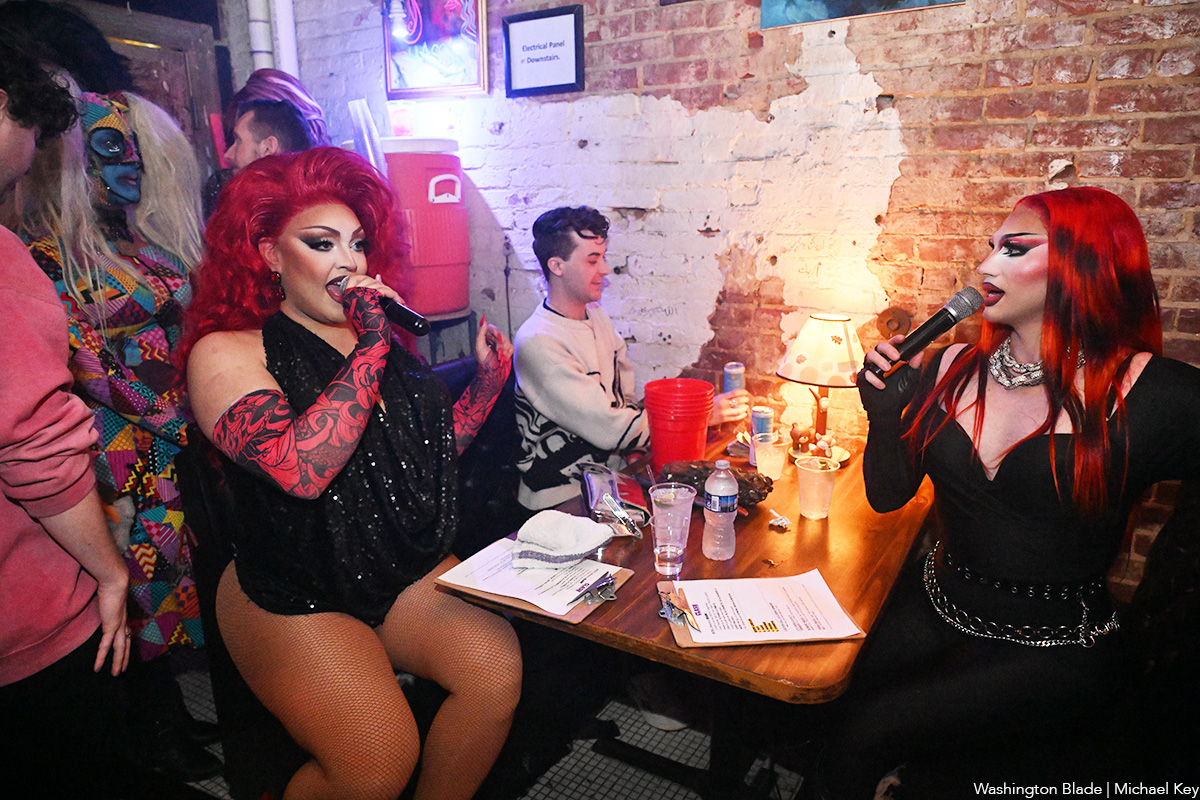
Crimsyn and Tatianna hosted the new weekly drag show Clash at Trade (1410 14th Street, N.W.) on Feb. 14, 2026. Performers included Aave, Crimsyn, Desiree Dik, and Tatianna.
(Washington Blade photos by Michael Key)
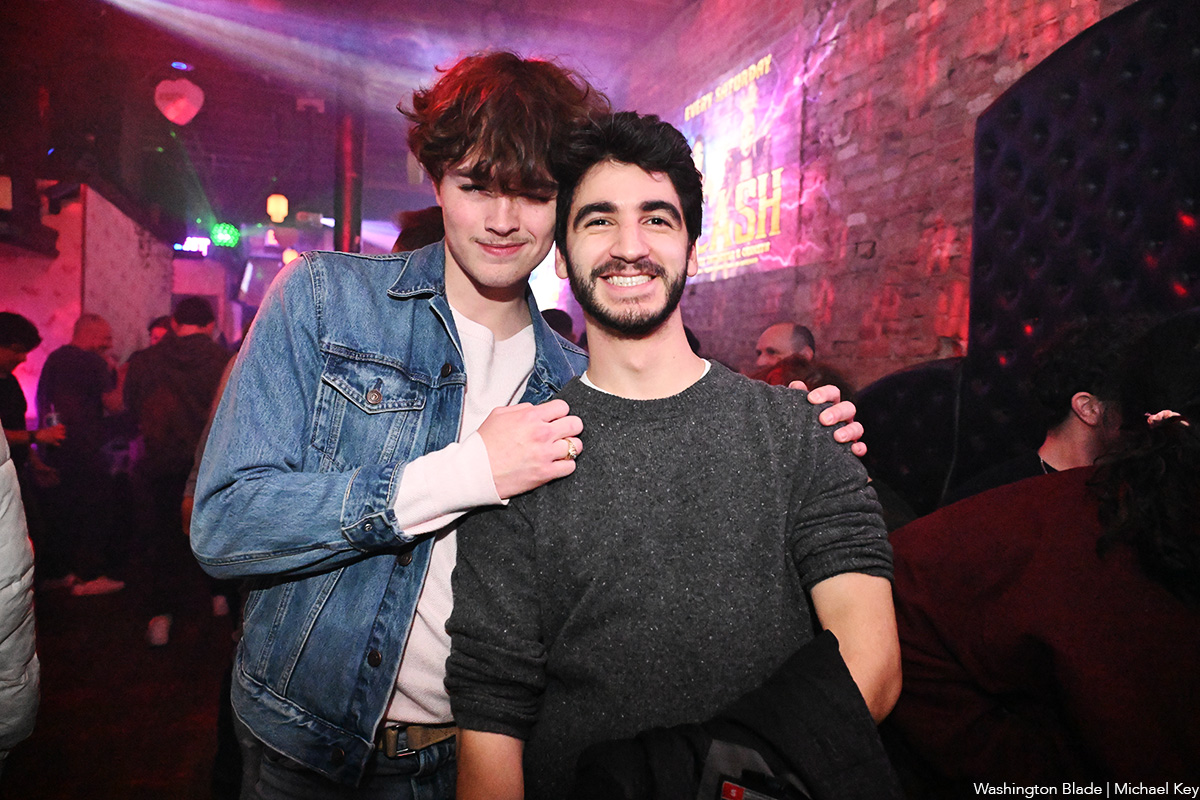
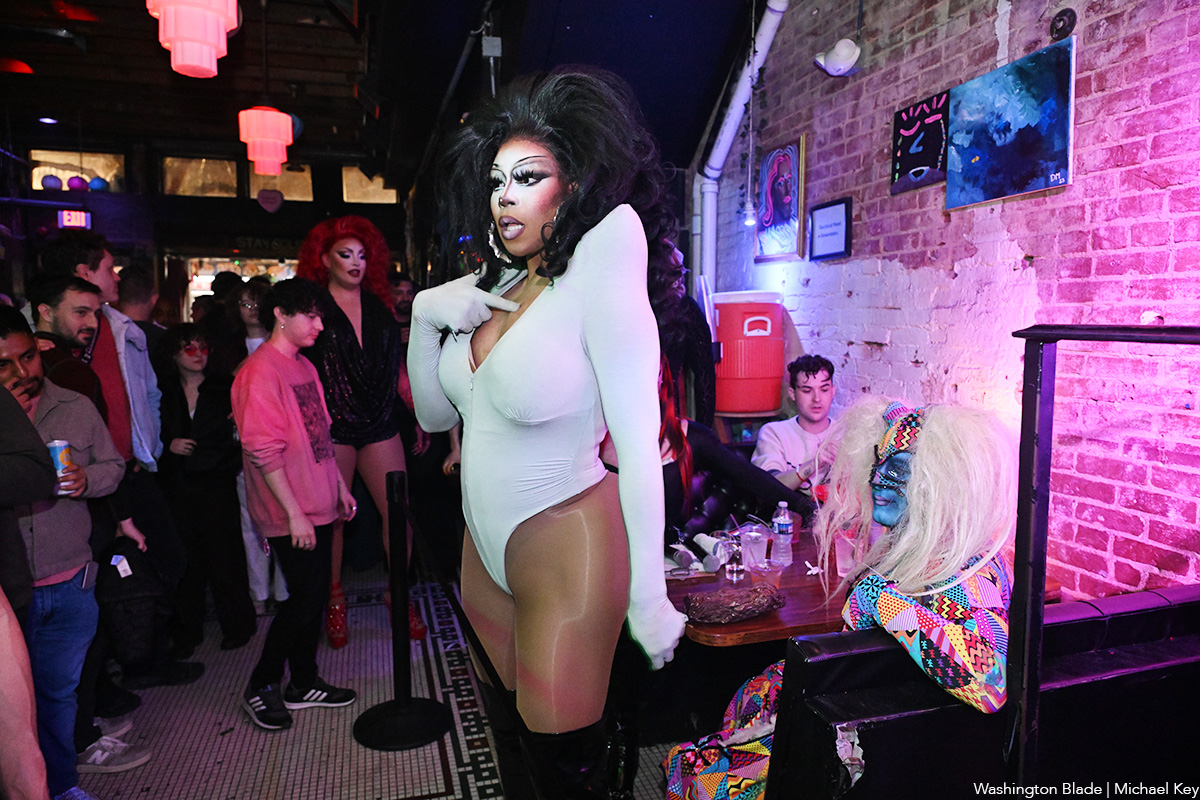
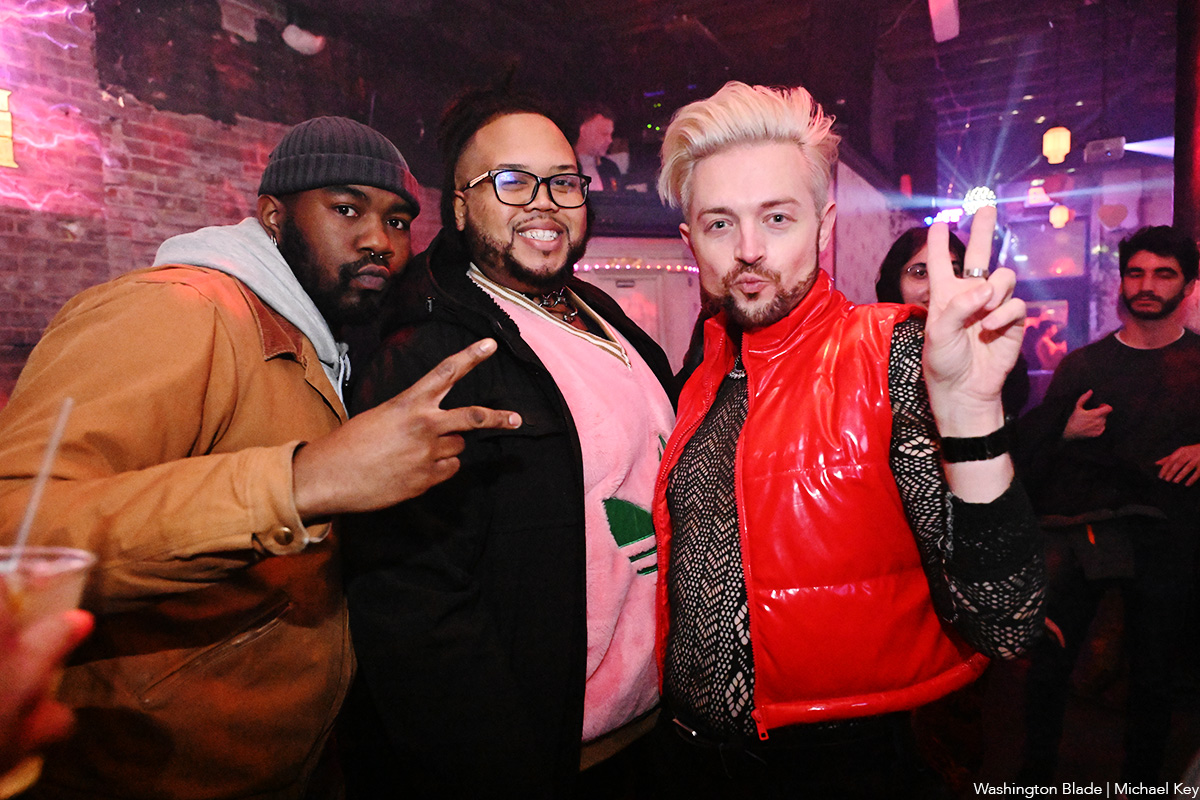
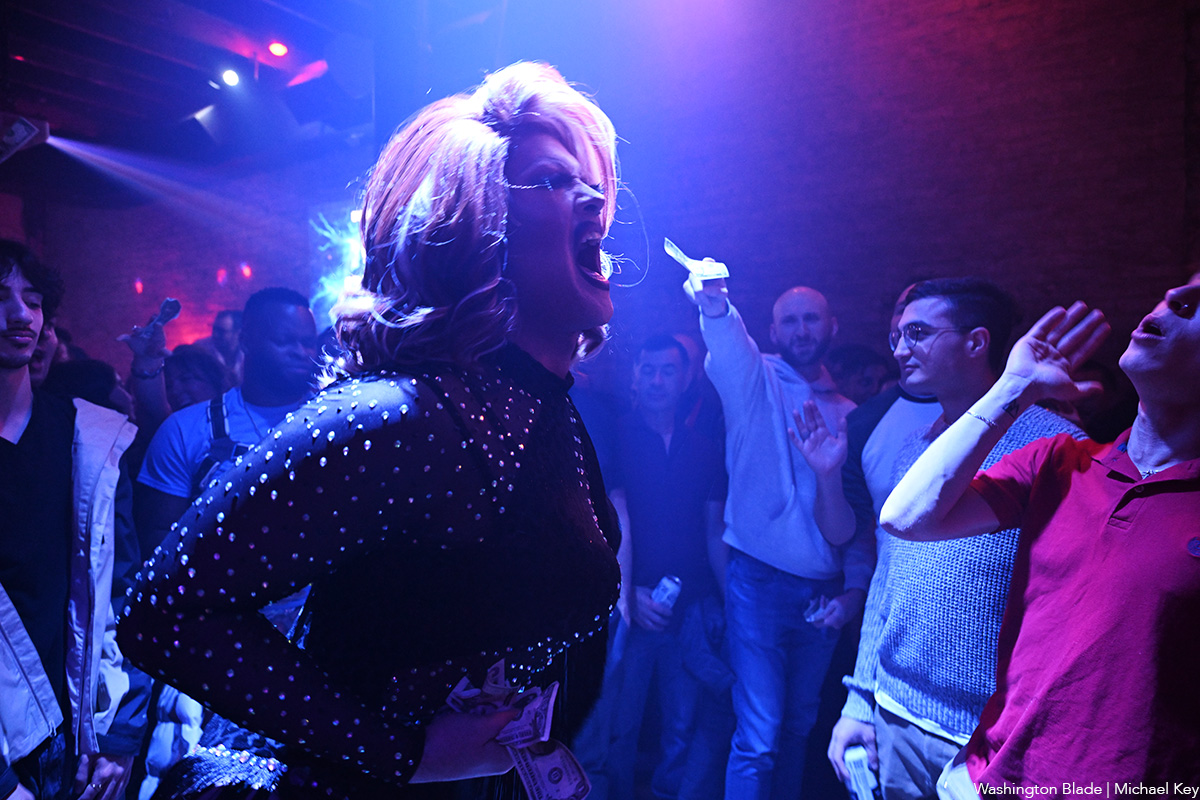
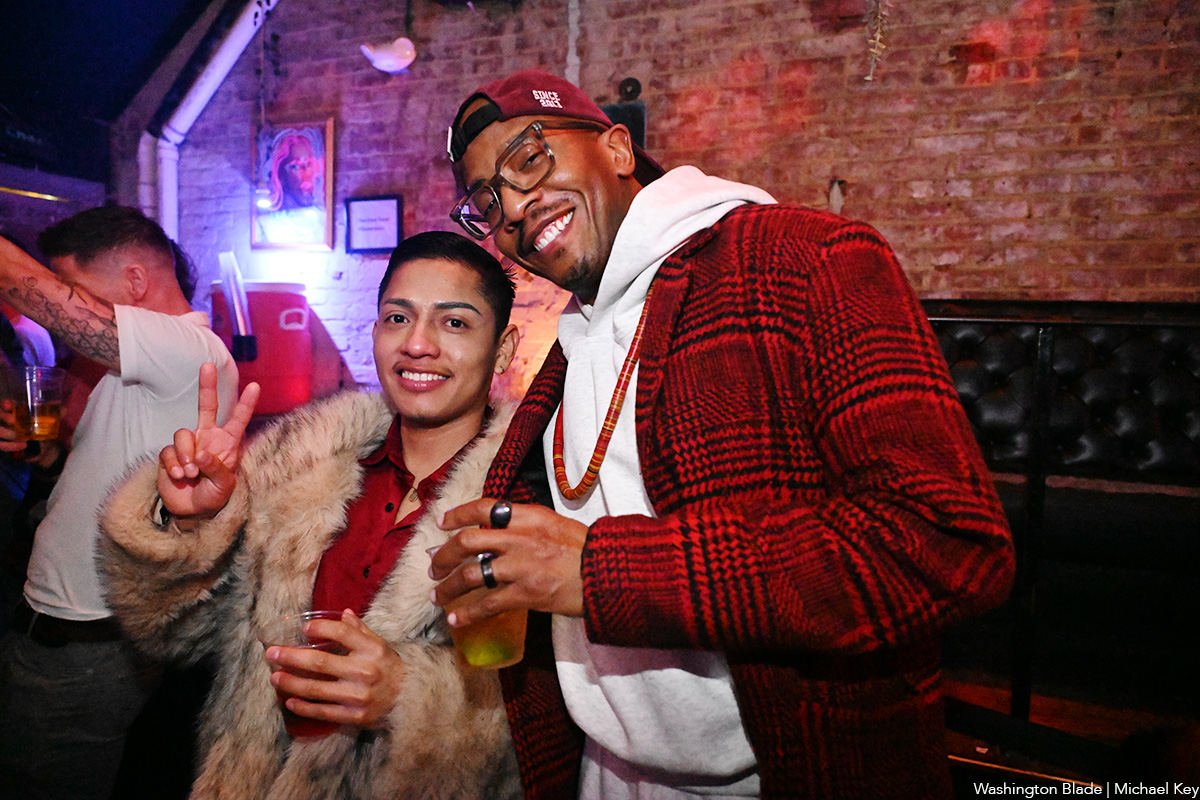
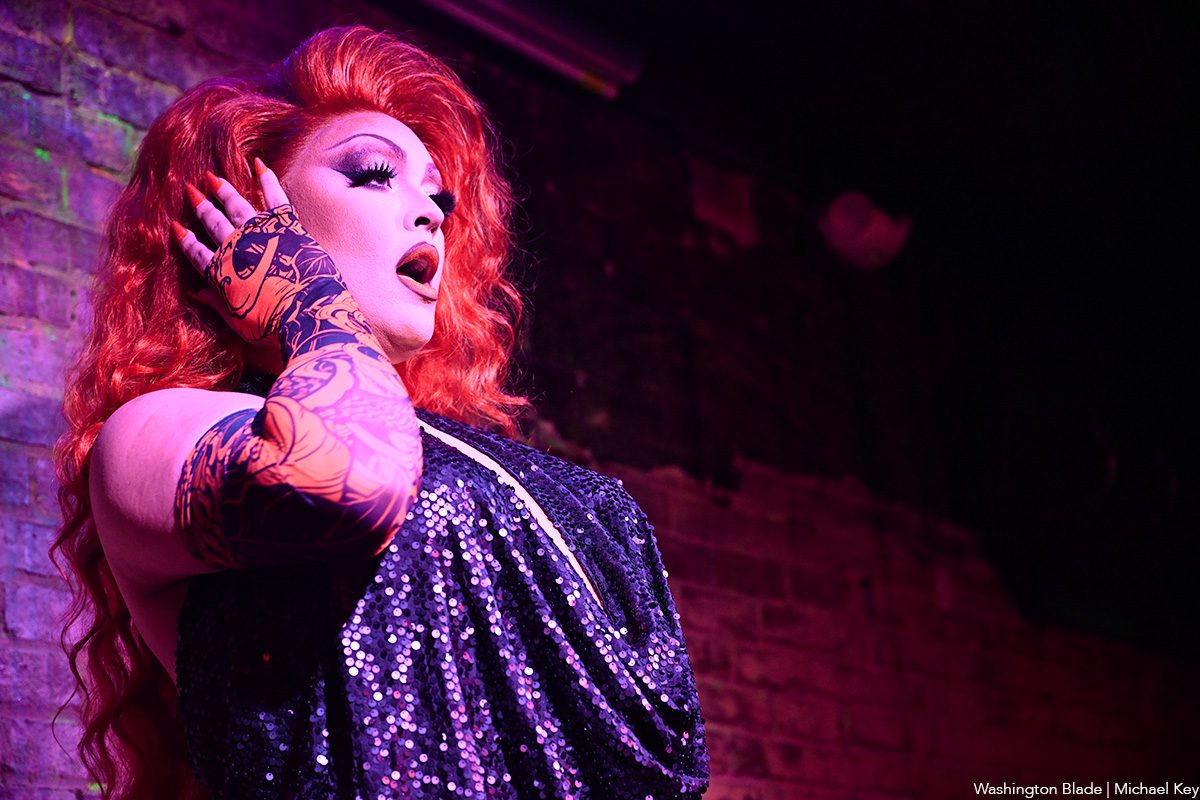
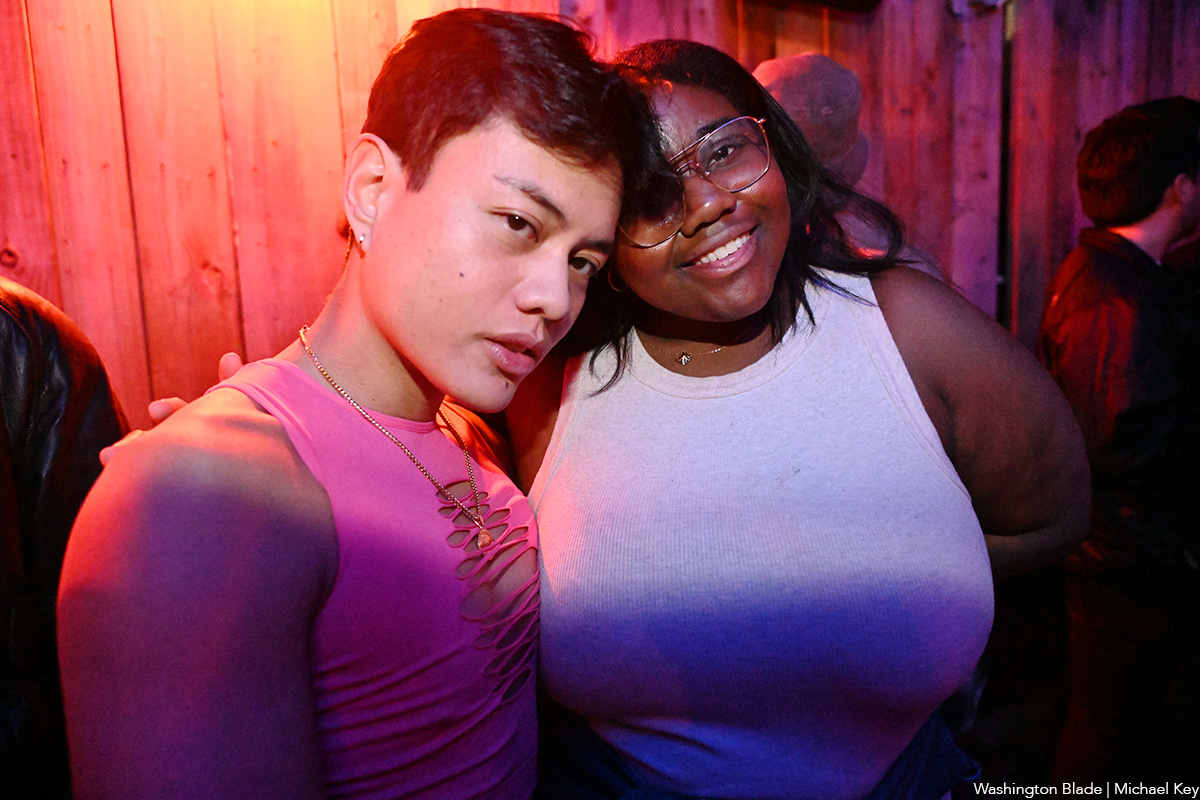
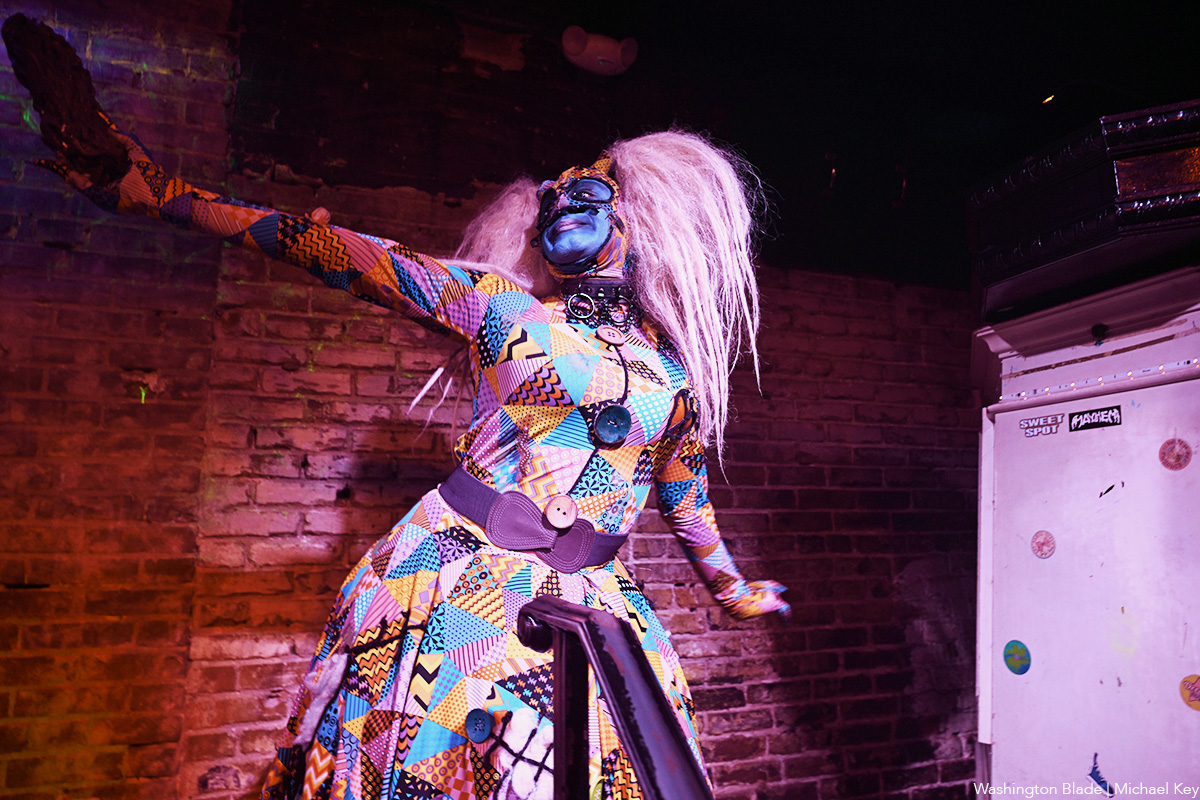
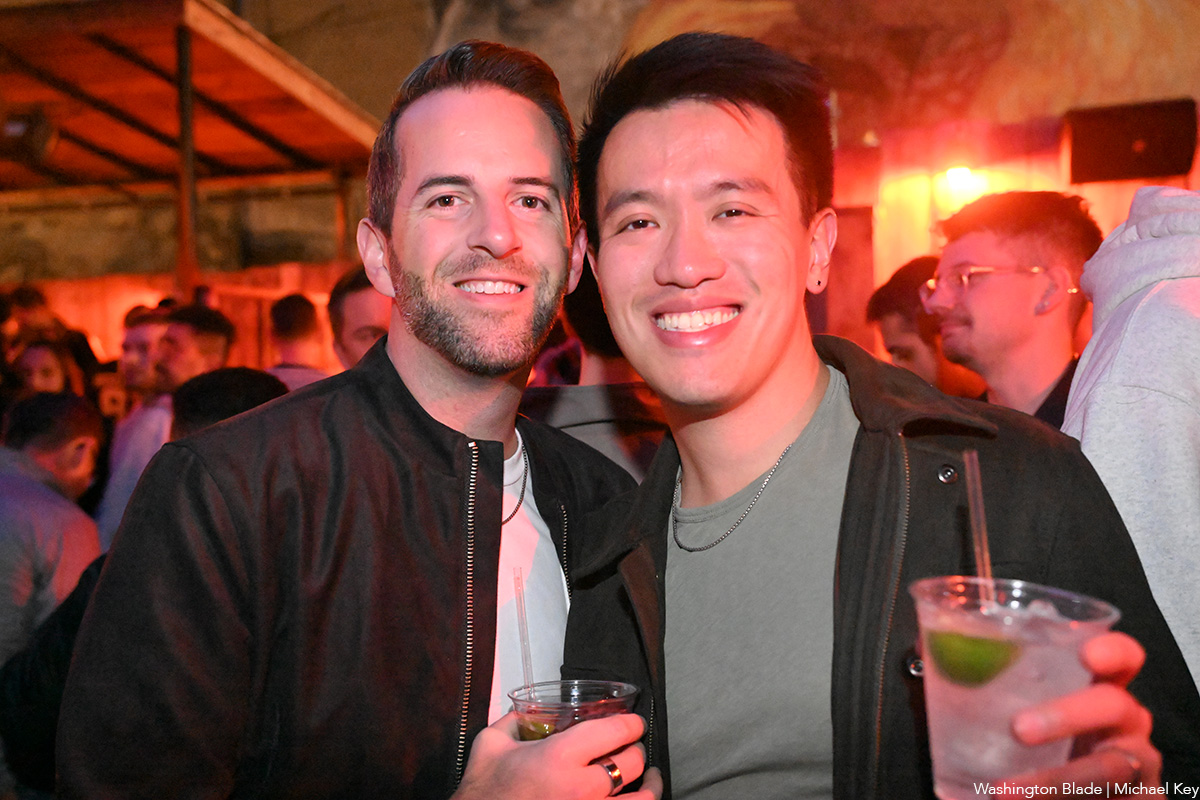
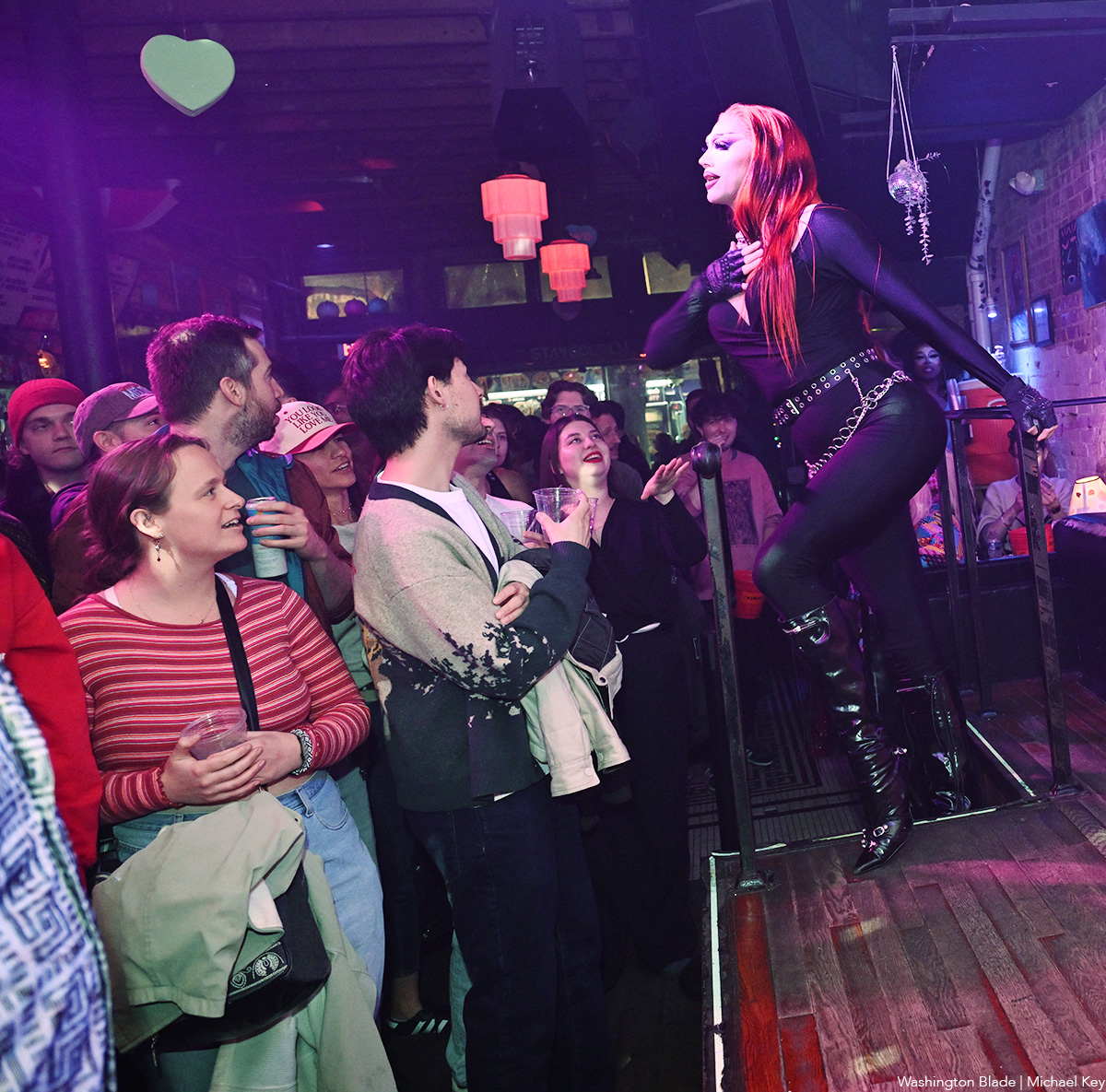
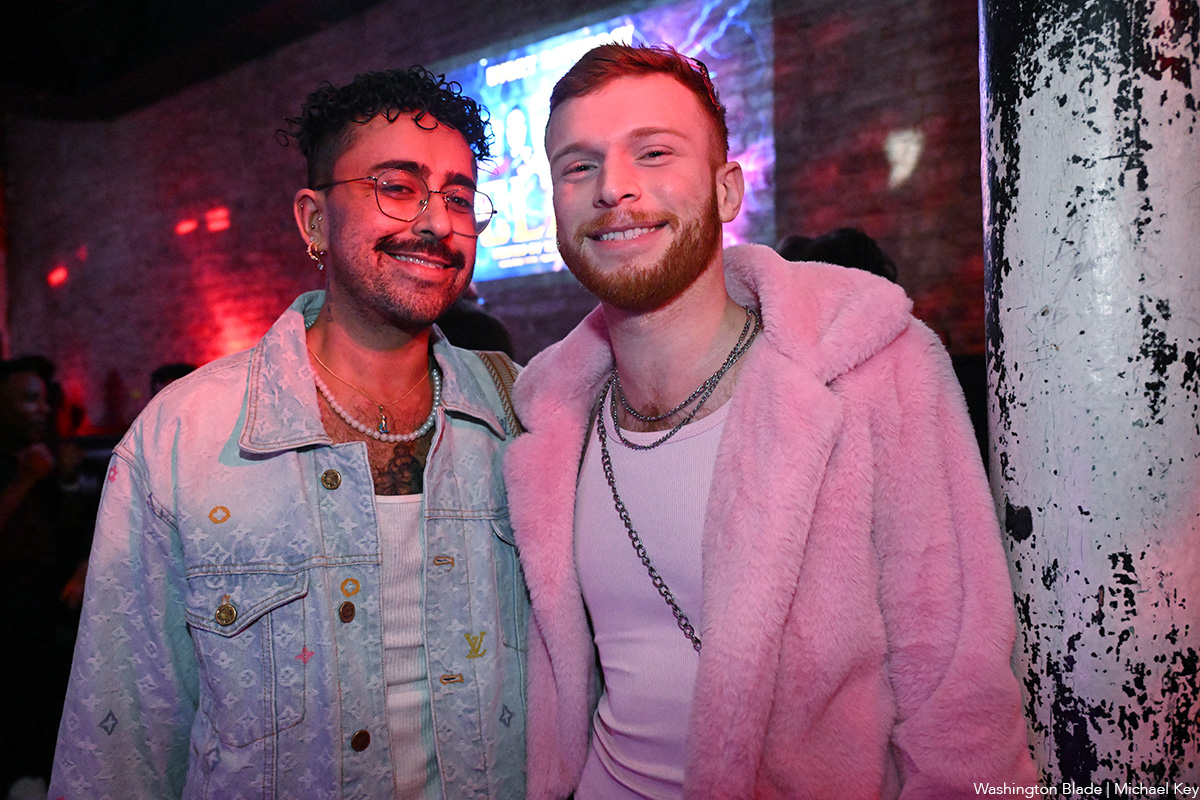
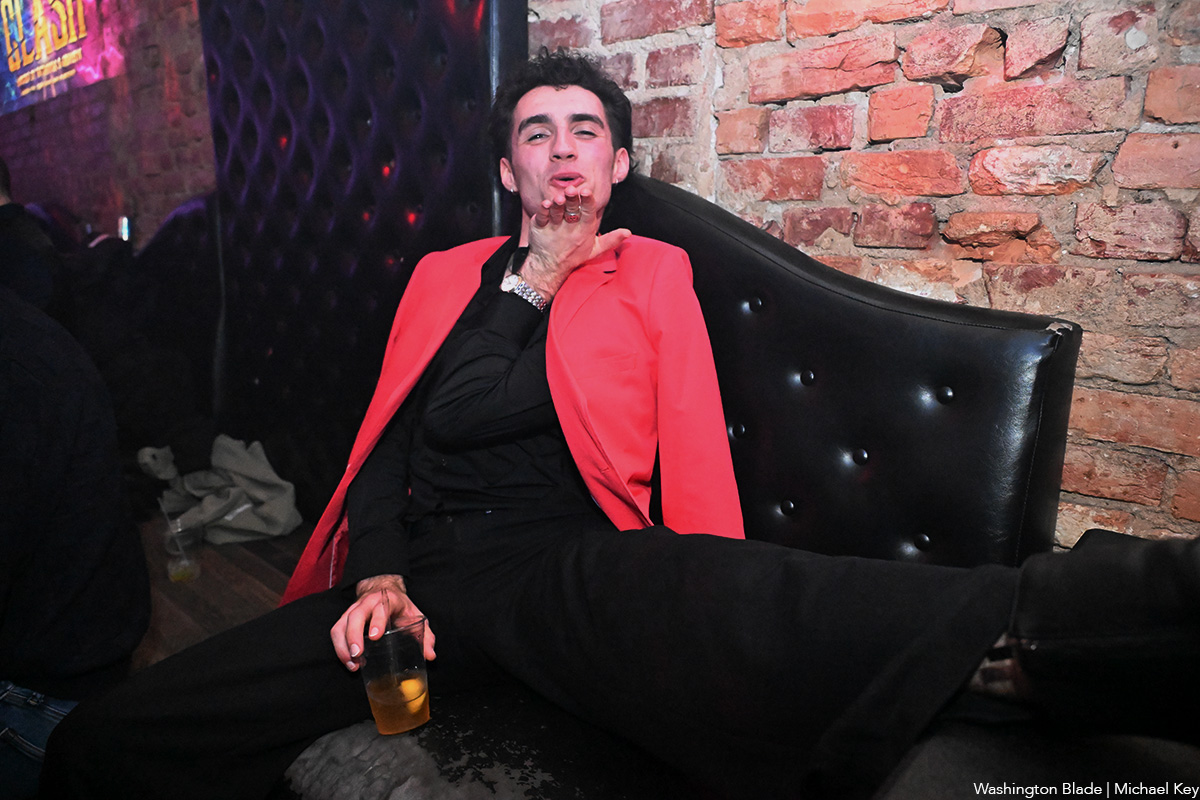
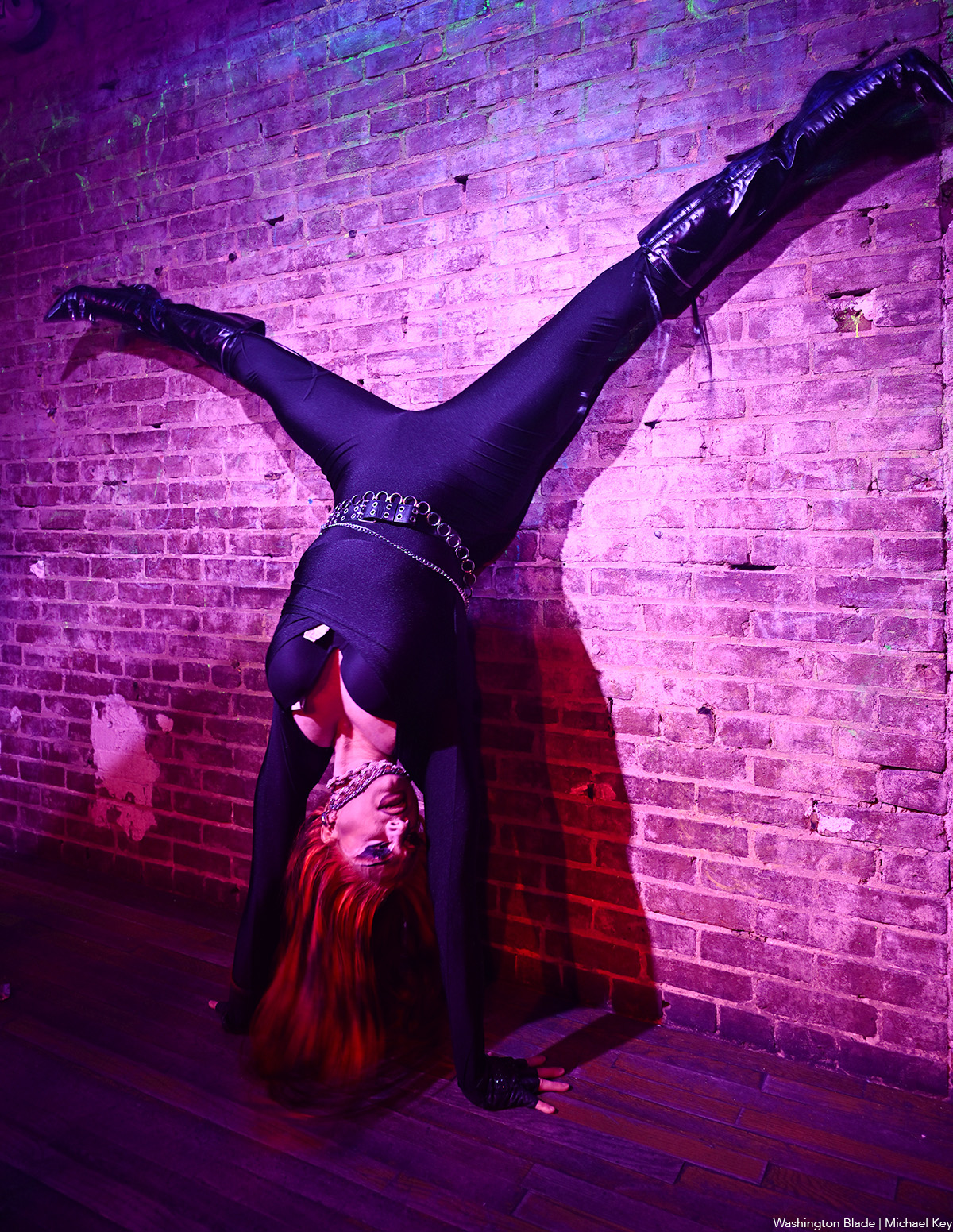
-

 Baltimore4 days ago
Baltimore4 days ago‘Heated Rivalry’ fandom exposes LGBTQ divide in Baltimore
-

 Real Estate4 days ago
Real Estate4 days agoHome is where the heart is
-

 District of Columbia4 days ago
District of Columbia4 days agoDeon Jones speaks about D.C. Department of Corrections bias lawsuit settlement
-

 European Union4 days ago
European Union4 days agoEuropean Parliament resolution backs ‘full recognition of trans women as women’




















